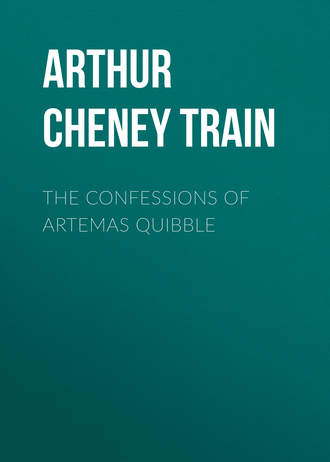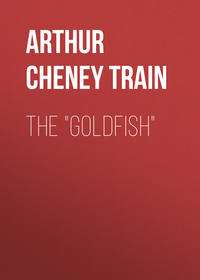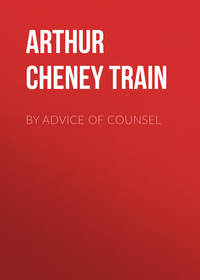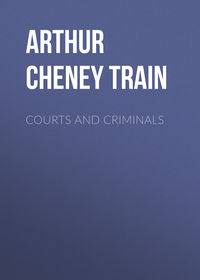 полная версия
полная версияThe Confessions of Artemas Quibble
CHAPTER II
My arrival in the metropolis was unaccompanied by any newspaper comment or by any particular excitement on the part of the inhabitants. I simply landed, after a seven hours' journey from Boston, with a considerable quantity of fine raiment—rather too fine, as I soon discovered, for the ordinary uses of a serious-minded, working youth—some fifty odd dollars, and a well-developed bump of self- confidence that was supported by a strong reserve resolution not to let anybody get ahead of me. I had all the assurance of a man double my years and an easy way of making acquaintances that was destined to stand me in good stead, but I do not wish to be understood as admitting that my manners were offensive or that I was in any degree supercilious. I was simply a good fellow who had always enjoyed the comradeship of other good fellows, and as a result felt reasonably sure that the rest of the world would treat him kindly. Moreover, I could dissemble without difficulty and, if occasion arose, could give the impression of being a diffident and modest young man, ready and anxious to order himself "lowly and humbly before his betters."
Yet I had seen enough of the world to know that unless a man puts a high appraisal upon his attainments and ability no one else is likely to do so, and that the public takes one, nine times out of ten, at his own valuation. Coming on the clay itself: I wore my hair rather long, with an appreciable modicum of bear's grease well rubbed in, side whiskers and white beaver, and carried a carpet bag on which was embroidered a stag's head in yellow on a background of green worsted. And the principal fact to be observed in this connection is that, instead of creating a smile as I passed out of the Grand Central Station, I was probably regarded as a rather smart and stylishly dressed young man.
I had a card to some young actors in the city, given me by my Thespian friends in Boston, and it proved but a short trip on the horse-cars down Fourth Avenue to the locality, near the Academy of Music, then as now frequented by the fraternity. I began my professional career, then, by taking lodgings in an actors' boarding- house, and I am free to confess that at the time I was undecided whether to follow the bar or the boards. I have since frequently observed that the same qualities make for success in both, and had it not been for the fact that I found my new friends somewhat down at the heels and their rate of emolument exceedingly low, as well as for a certain little incident to be recounted shortly, I might well have joined the group of future Booths and Forrests that loitered along the near-by Rialto, looking for jobs as Roman soldiers or footmen in some coming production.
But the change from my well-appointed lodgings in Cambridge and my luxurious surroundings at the Cock and Spur to a distinctly shabby theatrical boarding-house, where the guests plainly exhibited traces of the lack of proper ablutional facilities and the hallways smelt of cabbage and onions, was a distinct shock to my highly sensitive tastes. However, my new acquaintances proved warm-hearted and hospitable and did everything in their power to make me feel at my ease, with the result that in spite of the cabbage and the wooden slats that served as springs in my bed—which nearly filled the rear hall bed-room I had hired for one week at four dollars and twenty-five cents—I resolved to postpone entering upon an active career until I should know the city better and have made a few friends.
Those of my new comrades who were lucky enough to have employment did not rise in the morning until the neighborhood of twelve o'clock, and those who had no employment at all followed their example. I thus found myself adopting of necessity, as it were, the pleasant practice of sauntering out on Broadway after a one o'clock breakfast, and of spending most of the afternoon, evening, and following morning in or about the same locality. We usually went to some theatrical show on what was known as "paper," and I afterward joined my actor friends at a restaurant, where we sang songs and told stories until the gas-lamps were extinguished and gray dawn crept over the house-tops. Downtown—into the mysterious district of Wall Street—I did not, as yet, go, and I might still be haunting the stage entrances of the theatres had it not been for an adventure in which I was an involuntary participant.
It so happened that among my new acquaintances was a careless, rattle-brained youth known as Toby Robinson, who in spite of some histrionic ability was constantly losing his job and always in debt. He was a smooth-faced, rather stout, good-natured-looking person, of the sort who is never supposed to have done harm to anybody. Not long before he had enjoyed a salary of fourteen dollars per week, but having overslept several times running he had been discharged for absence from rehearsals. He had reached the limit of his resources about the time of my arrival in the city and had been in a most lugubrious frame of mind when I first had the honor of his acquaintance. Suddenly, however, he appeared one day with a large roll of bills and entered upon a period of lubrication and open-handed hospitality, in which we all participated. During this season of good cheer, as Toby and I were strolling down Broadway one afternoon, an ugly looking man who had been following us stepped forward and, touching my friend on the shoulder, said gruffly:
"The captain wants to see you."
The uttering of these cryptic syllables produced a most extraordinary effect upon my companion, for he turned deadly pale and the perspiration collected in beads upon his temples, while he commenced to wring his hands and bemoan his ill fortune.
"What is the trouble?" I inquired in great solicitude.
The belligerent stranger, however, pushing between us, grasped Toby firmly by the arm and marched him across the street, while I trailed behind in the nature of a rear guard. I had already begun to suspect that the ugly man was none other than an officer of the law, and visions of myself locked up in jail as a possible accomplice, although innocent of wrong-doing, hovered in my mind. Toby, giving every indication of guilt, slouched along beside his captor, occasionally glancing shamefacedly over his shoulder.
We were now nearing a police station, and our companion, for the first time showing any sign of personal interest, inquired if we had a lawyer. On receiving a negative reply, the officer strongly recommended our immediately retaining counsel in the person of one Gottlieb, who could be found across the street from the police station and whose precise whereabout were made obvious by means of a large sign about six feet by three and one-half in size, reading as follows:
ABRAHAM GOTTLIEB'S LAW OFFICE NOTARY DEEDS RENTS COLLECTED BAIL BONDS INSURANCE GENERAL ADVICEWithout giving Toby time for consideration the officer led us across the street and into the stuffy little den occupied by the lawyer.
"Here's the gent I told you of," said he, nodding in the direction of a hawk-faced little man smoking a vile cigar, who was sitting with his feet upon a table. "I'll leave you alone," he added, and sauntering across the threshold, took his stand in front of the window outside.
"Howdy," remarked Gottlieb, without arising or removing his cigar. "Mike tells me you're charged with obtaining money by false pretences."
"What!" gasped Toby, grasping the table for support. "False pretences!"
"Flying a bit of bad paper, eh? Come now, didn't you cash a check on the Cotton Exchange Bank for about six hundred dollars when there was only fifteen on deposit? Don't try to bluff me. I know your sort. Lucky if you don't get ten years."
"Save me!" wailed Toby. "Yes, I did cash a check, come to think of it, for that amount, but I had no idea my account had run so low."
Mr. Gottlieb spat into a sawdust box under the table and winked with great deliberation.
"How much have you got left?" he inquired indifferently.
Tony delved into his breeches and with trembling hands produced a roll of bills still of some dignity. Gottlieb stretched forth a claw, took them, placed them in his own pocket, and then swung his feet to the floor with alacrity.
"Come on, my lads," he exclaimed, "and I'll show you how we get the sinners off! All right, Mike." And he led the way across the street and into the station-house, where poor Toby was searched and his pedigree taken down by the clerk. It being at this time only about eleven in the morning we were then conducted to the nearest police court, where we found in attendance the unfortunate hotel keeper who had so unwisely honored Toby's check.
"You rascal!" he shouted, struggling to reach my unfortunate friend. "I'll show you how to take other people's money! I'll put you where you belong!" But the officers haled him back and he was forced to restrain himself until the could tell his story to the judge. This, it so happened, was not to be for several hours, and during this interval Gottlieb mysteriously vanished and as mysteriously reappeared. It was half after three before the judge announced that he would take up Toby's case. Now, the judge looked even more of a rascal than did Gottlieb, which was paying his Honor a high compliment, and I suspect that it was for this reason that the complainant had in the meantime sent round for his own lawyer to represent him. We were now pushed forward and huddled into a small space in front of the rail, while the lawyers took their places upon the platform before us.
"Your Honor," began the lawyer for the hotel man, "this fellow here has swindled my client out of six hundred dollars by inducing him to cash a worthless check."
"What have you to say, Mr. Gottlieb?" asked the judge.
"Confession and avoidance, your Honor," replied the attorney, with what appeared to me to be the slightest possible drawing down of his right eyelid. "Confession and avoidance. We admit the fact, but we deny the imputation of guilt. My client, Mr. Robinson, whose abilities as an actor have no doubt hitherto given your Honor much pleasure, was so careless as to forget the precise amount of his bank account and happened to draw a check for too large an amount. No one was more surprised and horrified at the discovery than he. And his intention is at once to reimburse in full the complainant, whose action in having him arrested seems most extraordinary and reprehensible."
"Your Honor," interrupted the other lawyer, "were there the slightest possibility of any such outcome I should be glad to withdraw the charge; but, as a matter of fact, this person is a worthless, lazy fellow who has not a cent to his name, and who induced my client to cash his check by leading him to believe that he was a man of substance and position. No doubt he has spent the money, and if not we might as well try to squeeze it out of a stone. This fellow is guilty of a crime and he ought to be punished. I ask your Honor to hold him for the grand jury."
"Well, Mr. Gottlieb," remarked the judge, "tell me, if you can, why I should not lock your client up. Did he not falsely pretend, by requesting the complainant to cash the check, that he had money in the bank to meet it?"
"By no means, your Honor," answered Gottlieb. "The proffering of a check with a request for money thereon is merely asking that the money be advanced on the faith that the bank will honor the demand made upon it. One who cashes a check does so at his own risk. He has a full remedy at civil law, and if the bank refuses to pay no crime has been committed. This is not a case for the penal law."
"That seems reasonable," said the judge, turning to the other. "How do you make this out a crime? What false pretence is there in merely inviting another to cash a check?"
"Why," answered the attorney, "if I ask you to cash a check for me, do I not represent that I have a right to draw upon the bank for the amount set forth? If not, no one would ever cash a check. The innocent person who advances the money has the right to assume that the borrower is not offering him a bad check. There is a tacit representation that the check is good or that the maker has funds in the bank to meet it."
"True—true!" nodded his Honor. "There is something in what you say. What answer can you make to that, Brother Gottlieb?"
"I have a hundred good arguments," replied the lawyer in a low tone. Then he added briskly: "But the intent, your Honor! There can be no crime without a wrongful intent; and how can there have been any such when my client honestly believed that he had the money in the bank to meet the check?"
"But," cried the other, "he knew very well he had not!"
"What evidence have you to that effect?" queried Gottlieb. "You say so, to be sure, but I, on the contrary, assert that he was perfectly honest in the matter. Now, there is absolutely nothing in this case to prove that he had any guilty knowledge to the effect that his account was too low to meet the draft in question. You have proven no scienter whatever."
"Ah!" exclaimed the judge. "That is it! You have shown no scienter!"
"Exactly!" cried Gottlieb—"no scienter at all."
"But how in the world could I have proved a scienter?" wrathfully demanded the lawyer. "I can't pry open the prisoner's skull and exhibit his evil intent."
"No, but you could have shown that he knew he had only a few dollars in the bank by the fact that he had previously tried to cash a similar check and that it had been returned. In any event, my own mind is clear on the subject. You have shown no scienter. The prisoner is discharged."
Poor Toby was so overcome by his unexpected release that he began to stammer out incoherent expressions of gratitude to the judge, such as "Oh, thank you, your Honor! God bless your Honor! Thank you, your Honor! I am an innocent man, your Honor!" until Gottlieb, grasping him by the arm, dragged him away from the rail and pushed him into the street. The complainant and his attorney indignantly followed us, the former loudly deploring the way modern justice was administered. Once outside Gottlieb shook hands with Toby and told him if he were ever in trouble again to look him up without fail. Toby promised gratefully to do so, and the lawyer was about to leave us and enter his office when it occurred to me that he still had my friend's roll of bills.
"But, Mr. Gottlieb," said I, "you are going to return Mr. Robinson's money to him, are you not?"
"What!" he exclaimed, growing frightfully angry. "Give him back his money! I have no money of his. It is he owes me money for keeping him out of jail."
"But how about the roll of bills?" I protested. "You certainly do not intend to keep all of that?"
"Certainly—that is my fee," he retorted calmly; "and small enough it is too!"
"How much was there in that roll, Toby?" I asked.
"About five hundred dollars," answered my friend. "But let him keep it, by all means!"
"Why," I exclaimed, "he has done nothing to earn such a fee. He merely got up and said that you had no scienter—whatever that is. It is not worth more than ten dollars."
"Ten dollars!" shouted Gottlieb. "Ten dollars! Why scienter is one of the most complicated and technical defences known to the law. Ten dollars! Scienter is worth a thousand! Your rascally friend got his money for nothing, didn't he? He's lucky to be outside the bars—for if I ever saw a guilty man he's one. Get along, both of you, or I'll call an officer!"
And with that Gottlieb slipped inside his office and banged the door.
"Come along, Quib!" urged Tony; "there's a great deal of truth in what he says. I don't begrudge it to him. It was well worth it to me."
"Lord!" I groaned. "Five hundred dollars just for scienter. If that is the law, then I'll turn lawyer."
And with that idea growing more firmly each moment in my mind I returned to the boarding-house with my friend.
CHAPTER III
I am free to confess that the ease with which Counsellor Gottlieb had deprived my friend Toby of the ill-gotten proceeds of his check —or, for his sake putting it more politely, had earned his fee— was the chief and inducing cause that led me to adopt the law as a career. I shall not pretend that I had any lofty aims or ambitions, felt any regard for its dignity or fascination for the mysteries of its science when I selected it for my profession. My objects were practical—my ambition to get the largest financial return consonant with the least amount of work. My one concrete experience of the law had opened my eyes to its possibilities in a way that I had never dreamed of, and I resolved to lose no time in placing myself in a position to rescue others from harm on the same pecuniary basis as did Mr. Gottlieb.
Of course I realized that I must serve an apprenticeship, and indeed the law required that were I not a graduate of a law school that I must have worked as a clerk for two years before I could be admitted to the bar. Accordingly I began to make inquiries as to what were the best law firms in the city, and before long had acquired pretty definite information as to who were and who were not in high standing. Now, I had no letters of introduction and nothing to recommend me except a certain degree of maturity and a cultivated manner of speaking, and I might and probably should have been trying to this day to break into some sedate and high-toned old-fogy office had it not been for one of those accidents with which my career has been replete.
I had visited all the firms on my list without finding any who wanted to take in a student. Indeed all the offices seemed filled if not crowded with studious-looking young men whose noses were buried in law books. In one or two, to be sure, I might have secured admittance and been given desk room in exchange for the services of my legs as a runner of errands and a server of papers, but none had any idea of paying anything. The profession at the bottom was more overcrowded than the gallery of the Academy of Music when they ran Rosedale. Each night as I returned to my lodgings I felt more and more discouraged. Its smell of cabbage came to have for me an inexpressible sensation of relief, of protection, even of luxury. Here, at any rate, even in an actors' boarding-house, I was independent, as good as anybody, and not regarded as if I were a beggar on the one hand or a questionable character on the other.
How long this might have continued I have no means of knowing, but one afternoon as I was trudging uptown, still holding in my hand a copy of a legal journal, the advertisements in which I had been engaged in sedulously running down, my attention was attracted by a crowd gathered in the street around a young man who had been so unfortunate as to be run over by a stage. There was nothing external to indicate the extent of his injuries, and as I drew nearer two persons assisted him to his feet and began to lead him toward the nearest store. Having nothing better to do I walked along with them, and after they had gone inside remained looking curiously through the window. While I was thus engaged a stout, bustling man of about forty years of age came hurrying down the sidewalk and turned to enter the store. As he did he observed me apparently waiting there and his eye with a quick glance took in the title of the paper in my hand. Instantly he stepped up beside me and tapping me on the arm said in a low tone:
"Whom do you represent?"
I was somewhat taken aback by this inquiry, not seeing at the moment its immediate relation to the business at hand, but for want of a better answer I replied in the same spirit:
"Artemas Quibble."
"Oh! Quibble, eh! I've heard of him. But look here, my young friend, there is no reason why honest men should cut one another's throats. Tell my friend Quibble I was here before ye and keep this for yourself."
And with that he peeled a twenty-dollar bill from the top of a heavy roll that he produced from his pocket and placed it within my palm.
"Very good," said I. "It may cost me dear if Quibble hears of it, but a man must live, and I work at starvation wages."
I placed the bill in my breast pocket and made way for him to enter the store, which he did without more ado. Why this busy gentleman should gratuitously present me with twenty dollars did not at the moment occur to me. I continued on my way northward, pondering upon the question, and passed the street upon which the police court was located and Counsellor Gottlieb had his office. The thought came into my mind that here was the very person to shed light upon the subject and I turned the corner and opened the door. Gottlieb was in his customary position with his feet elevated upon the table before him.
"Well," he said, "I didn't expect you back so soon."
"I've come for free advice this time," I answered.
"Oh," he grunted. "Well, in that case perhaps you won't get it."
Somehow I had taken a shine to the fellow, for all his robbery of poor Toby, and I admired his quickness of perception and readiness of speech. Perhaps he too felt not unkindly toward me. At any rate I told him my story.
"Now," says I, "what d'ye make of it?"
Gottlieb laughed.
"Was he a fat little turkey with gray eyes?" he inquired.
"The same," I replied.
"Then it was Tom Kelly," he answered. "On his daily still hunt for the maimed, the halt and the blind. You say the chap had been run over by the stage? Well, Tom'll take his case on a contingent fee—fifty per cent. to Tom and fifty per cent. to the client of all that comes of it—bring an action against the stage line and recover heavy damages. Oh, it's terrible to think what that poor injured young man will suffer. To-day he may feel quite well, but to-morrow he will have all kinds of pains in his head and eyes, his spine will ache, he will experience symptoms of a nervous breakdown. He will retire to bed and not emerge for six months, and when he does he'll be a hopeless and helpless cripple for life. Tom is an artist, he is, in his own line. They tell me he made sixty thousand last year out of his accident practice alone. Why, the case he gave you twenty to keep out of may net him five thousand dollars."
"If I'd known that it would have cost him fifty!" I said, feeling that an unjust advantage had been taken of me.
"Twenty is the regular rate," answered Gottlieb. "There are too many chances to make it worth much more merely to get the other fellow out of the way. Sometimes, though, I've paid as high as fifteen hundred for a case."
"Fifteen hundred!" exclaimed I.
"Yes, and got a verdict of nineteen thousand, of which I pocketed ninety-five hundred and four hundred dollars costs besides."
"Whew!" I whistled.
"Oh, there's pretty good pickin's on occasion even for a police- court lawyer," he continued; "but it's nothin' to the return from what I might call legitimate practice. Now, there's old Haight, of Haight & Foster, for instance. He gets half a dozen twenty- thousand-dollar fees every year, and all he has is strictly old- fashioned probate and real-estate practice and a little of this new-fangled railroad business. My great regret is that I didn't stick to regular trade instead of going after easy money. Who's Gottlieb now? Just a police-court lawyer, when he might be arguing before the Supreme Court of the United States! My brain's just as good as Haight's. I've licked him many a time in my young days. And then I get tired of all this hogwash! I tell you it's dirty business, most of it!"
"Well," I answered, remembering "scienter," "I've no doubt that you could beat them all. But I fancy you have nothing to complain of in the way of returns, yourself. What worries me is how to get any start at all. I've tried half the law offices in town."
Gottlieb listened with some interest as I outlined my experiences.
"But," he exclaimed, "you didn't go to the right person. You should have tackled the head of the firm himself. Find some sort of introduction. Flatter him. Offer to work for nothing—and, trust me, he'll have you. Now, my advice is to go straight to old Haight and make up your mind to get into his office willy-nilly. It'll be worth three thousand a year to you to graduate from there. It'll give you the tone you need in the profession. There are two qualities that make for the highest success in the law—honesty and dishonesty. To get ahead you must have one or the other. You must either be so irreproachable in your conduct and elevated in your ideals that your reputation for virtue becomes your chief asset, or, on the other hand, so crooked that your very dishonesty makes you invaluable to your clients. Both kinds of lawyers are equally in demand. Some cases require respectability and some dirty work. But the crooked lawyer has got to be so crooked that everybody is afraid of him, even the judge. Now, the trouble with me is that I'm too honest. Sometimes I wish I were a crook like the rest of them!"





